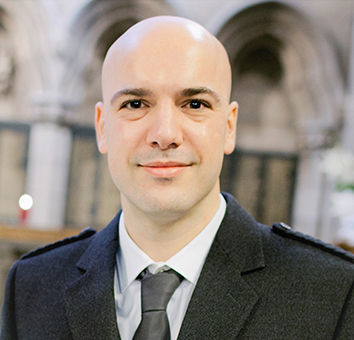ASSEE 2023 - Bayesian Machine Learning Methods for Modeling Macroeconomic and Financial Time Series
The 17th Advanced Summer School in Economics and Econometrics was held from July 9th to July 15th, 2023, at the University Campus in Rethymno, Crete. The topic of the School is on “Bayesian Machine Learning Methods for Modeling Macroeconomic and Financial Time Series” and the guest speaker was Prof . Dimitris Korobilis.

|
Dimitris Korobilis is Professor of Econometrics at the Adam Smith Business School, University of Glasgow and senior fellow of the Rimini Center for Economic Analysis. He works in the field of applied macroeconomics and finance, and applied econometrics. He has worked as consultant for (among others) the European Central Bank, the South African Reserve Bank, and the Scottish Government, and his forecasting models have been adopted by numerous international organizations. Dimitris has published in Journal of Econometrics, Review of Economics and Statistics, and International Economic Review, and he serves as an Associate Editor for Studies in Nonlinear Dynamics and Econometrics. |
Since 2006 the Department of Economics of the University of Crete is successfully running its Advanced Summer School in Economics and Econometrics. The broader objective of this series of events is to provide advanced training for young researchers from all over Europe and beyond on important disciplines of economics and econometrics. The Summer School follow a traditional structure: lectures in the morning and computer practical sessions in the afternoon. The specialized topic varies from year to year and reflects issues that are currently lively areas of new research and policy interest. The faculty is comprised of leaders in the field, and offers an overall coverage of the specialist area.
Through systematic interaction participants are encouraged to compare their approaches and examine their research work. A unique opportunity is given to advanced doctoral students to present their own work and to discuss it with the Guest Speaker. The Advanced Summer School Series on Economics and Econometrics facilitates the establishment of contacts between young researchers coming from various universities and research institutions throughout Europe.
Course Description
Course aims and overview
The main aim of this course is to help develop an understanding of Bayesian methods relevant for the analysis of modern financial and macroeconomic time series. The emphasis throughout this course is on Bayesian estimation and computation, with emphasis on flexible modelling and machine learning inference for high-dimensional cases.
This short course will introduce a very large spectrum of time series models used in macroeconomics and finance. Instead of focusing on the theoretical time-series properties of these popular models, we will delve deeply into estimation issues which are of practical importance for applied researchers and PhD students.
By the end of this course the student should be able to:
- Specify flexible regression models that account for nonlinearities, stochastic volatility, or models that allow flexible modelling of the whole density of the data (quantile regression; density regression)
- Estimate models with more parameters that observations, be this a simple linear regression or a more complex multivariate model
- Compute parameters using a variety of traditional (e.g. MCMC) as well as machine learning algorithms (e.g. variational Bayes)
- Devise new models and algorithms in order to tackle novel empirical problems
Lecture Outline
Part I: Foundations
- Day 1:
- Lecture 1a: An overview of Bayesian Inference; The linear regression model
- Lecture 1b: Bayesian computation; The Gibbs sampler and Metropolis Hastings algorithms
- Lab 1: Bayesian computation basics
- Day 2:
- Lecture 2a: High dimensional estimation using shrinkage and variable selection
- Lecture 2b: Efficient computation with hierarchical priors
- Lab 2: Exercises on linear regression and extensions
Part II: Applications
- Day 3:
- Lecture 3a: Vector autoregressions, Part I
- Lecture 3b: Vector autoregressions, Part II
- Lab 3: Bayesian VARs for monetary policy
- Day 4:
- Lecture 4a: Time-varying parameters and stochastic volatility, Part I
- Lecture 4b: Time-varying parameters and stochastic volatility, Part II
- Lab 4: TVP regressions and VARs
- Day 5
- Lecture 5a: Bayesian quantile regression
- Lecture 5b: Factor models
- Lab 5: Modeling macro
Readings and resources
- Korobilis, D. and Shimizu, K. (2022). “Bayesian approaches to shrinkage and sparse estimation”, Foundations and Trends® in Econometrics, 11 (4), pp. 230-354.
- Koop, G. and Korobilis, D. (2010). “Bayesian Multivariate Time Series Methods for Empirical Macroeconomics”, Foundations and Trends® in Econometrics, 3, pp. 267-358.
- Koop, Gary (2003) Bayesian Econometrics, Wiley.
- Koop, G., Poirier, D. and Tobias, J. (2007) Bayesian Econometric Exercises, Cambridge University Press
- Bauwens, L. and Korobilis, D. (2013). “Bayesian Methods”, in Handbook of Research Methods and Applications on Empirical Macroeconomics.
Paricipants
- Konstantinos Pitsilkas
- Guangyuan Ji
- Sven Lehmann
- Miguel Sanchez Martinez
- Buchun Wang
- Malin Jensen
- Zacharias Bragoudakis
- Martin Jehli
- Rasmus Rousing
- Ioannis Antoniou
- Stefanos Gkionis
